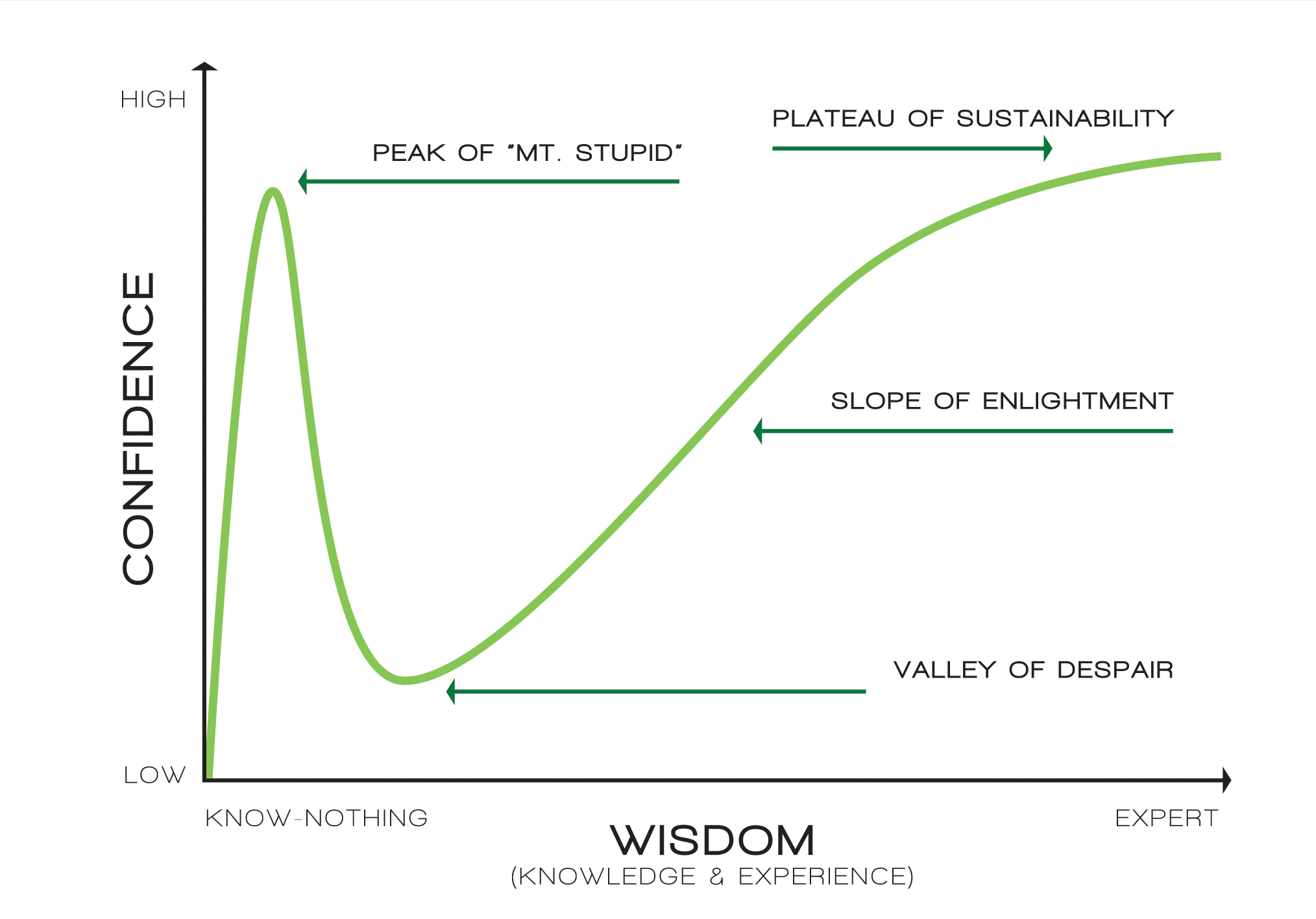Adopting an I Don’t Know Mindset for Personal Growth
I can pick new topics and skills up quickly, I received A’s in school, and am able to connect with others on many different levels. I have 2 math degrees, am a reader of hundreds of books, and someone who is always looking to grow and improve my situation through what I’m learning on a daily basis.
I spend hours each week learning new things and apply them in my daily life.
Yet all of what I just mentioned doesn’t matter.
I’m self-aware. In particular, I’m self-aware that I know very little.
That’s right.
In the grand scheme of things, I don’t know much about anything.
That’s why I push to have what I call an “I don’t know mindset” (also called a growth mindset) in life and to live without ego towards my ideas and thoughts.
Dr. Carol Dweck, a pioneer in growth mindset research, defines it as “the understanding that abilities and intelligence can be developed.” Basically, the knowledge that even if you don’t know everything (none of us do, of course), you can always learn more and continue to develop and cultivate skills and knowledge!
“The only thing I know is that I know nothing, and I am no quite sure that I know that.” – Socrates
The Dunning-Kruger Effect and Perceived Knowledge
There are so many things I do not know. As humans, we tend to overestimate what we think we know.
There are two concepts I want to share with you now to illustrate my point.
The Dunning-Kruger Effect is shown in the chart below:

When starting out in a new field, we start to learn a little bit and become very confident in our ability to perform. Think about when you first started learning math. What was the first thing that was taught? Counting! 1, 2, 3, 4…
We were confident because we could count, but then came addition. Then came subtraction, and then came word problems and all the other mumbo jumbo math stuff I don’t want to talk about here.
As we learned more, it became more difficult, and we became more weary of our ability to perform.
As our level of experience grew, we tend to be less confident in our abilities.
Many of us stay at the initial level because we feel confident where we are in our knowledge.
There are so many people in America who think they are experts on what’s going on in Washington DC, or in the C-Suite at their company, and yet don’t have political science degrees, MBAs, etc. This is the Dunning-Kruger effect at work.
As You Start to Know More, You Realize You Know Less
What’s interesting to me is that as you learn more in a subject, you realize you actually don’t know anything in the subject. In addition, you realize how much more there is to know and find out.
We go from “I know nothing” to “I’m an expert” to “I know nothing” as our actual level of knowledge increases! See this illustrated in the chart below:
Like I mentioned above, there’s quite a bit I know and am looking to improve my knowledge on. What I’m realizing more and more though is that I really don’t know anything.
Adopt a Growth Mindset and Become More Successful
Would there be a point to learning if you knew everything? No.
There would be no point to being curious or asking questions about the world or other people. Frankly, life would probably be pretty boring.
I’m suggesting working on adopting a growth mindset, or an “I don’t know mindset” for success.
How can you do this?
There are a few strategies that I’ve employed over the years to adopt a growth mindset myself.
- Live without an Ego
- There are 7 billion people and counting on this Earth. Do I really matter in the grand scheme of things? Does anyone actually care what I think? Am I better than anyone? The answer to all of these questions is NO.
- Believing that everyone is unique and no one is below you will allow you to live without an ego and put yourself in the proper mindset.
- Ask Questions to Clarify the Situation
- Where are you from? Why did you pick that major to study in college? What excites you about life? Why are you doing this job and not that job? How many kids do you have? Where is your favorite place to visit? Ask 100 people these questions and you will get 100 different answers.
- Many of my mistakes at work came from a misunderstanding of the problem. Would you please clarify this piece? I think I know what you are saying, is it this? Is this problem similar to this other problem? Asking questions like these will help you get clarity into the situation and shows that you are open to growth and understanding.
- Become More Self Aware
- As I’ve learned more, I’ve realized that I’m right with my intuition and thoughts quite often. That being said, I’m also cognizant that even if I’m right, there can be something I can add to my knowledge base. I don’t want to fall prey to the Dunning-Kruger effect! Instead, I want to have a growth mindset that says “I don’t know everything, but I am always learning new things.”
- Realizing when you are right and when you are wrong will allow you to navigate various situations with ease.
- For more information on becoming self aware and increasing your emotional intelligence, see these books for emotional intelligence.
- Always Look to Learn Something in Every Interaction
- One thing I’ve tried to do is whenever I go to a new website, pick up a book, or start talking to someone new is try to play investigator and try to learn something from that person. Everyone and everything has a story. There are many reasons she is like that or he is doing this. Asking questions and getting to the root of the situation is a great strategy to add to your repertoire.
Confidence is Still Key
One clarification point I’d like to make here is if you know something, I’m saying if you really know it, then be confident.
Self-doubt and a lack of confidence will hinder your ability to succeed.
If you know something, it’s important to share what you know and help others. Whenever a knowledge gap exists, there is an opportunity to teach and learn.
If you are at work and your boss asks you a question, don’t say “I don’t know” if you know the answer. But if you don’t know the answer, instead of lying, make sure to say, “I’ll get back to you with a clear answer.” This is an example of using a growth mindset because while you’re admitting that you don’t have the answer, you’re also communicating that you will look into it and figure it out.
Conclusion
Adopting an “I don’t know mindset” will help you grow. Being curious, asking questions, and uncovering the details for yourself will allow you to become more knowledgeable and valuable over time.
Even experts never stop learning – there is always something to learn and add to your portfolio of knowledge or skill set.
I ask that after reading this post, that you go out and recognize how you act when you are in conversation with someone who incorrectly says a phrase or fact. I’d ask that you also recognize if you start to talk about a subject you don’t know too much about and talk about it like you are an expert.
While I do believe there exists a learning and teaching opportunity whenever a knowledge gap exists, being able to say, “I don’t know if I’m knowledgeable in this area to speak on the matter”, and then to go and figure out the problem or idea at hand will set you up for success more often than not.
The only thing I know is that I know nothing at all.
Be curious, be courageous and be tenacious. Cultivate a growth mindset.
Readers: when you approach a new problem, do you assess it from various angles? Are you set in your ways? When is it okay to say “I know”, and move on?

